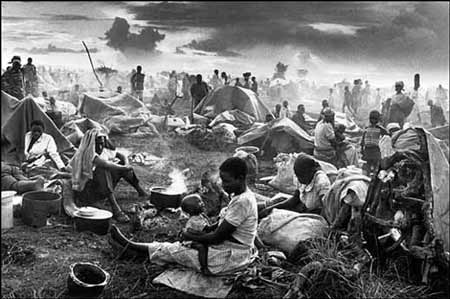
"RWANDA IS SPECTACULAR to behold. Throughout its center a winding succession of steep, tightly terraced slopes radiates out from small roadside settlements and solitary compounds. Gashes of red clay and black loam mark fresh hoe work; eucalyptus trees flash silver against brilliant green tea plantations; banana trees are everywhere. On the theme of hills, Rwanda produces countless variations: jagged rain forests, round shouldered buttes, undulating moors, broad swells of savanna, volcanic peaks sharp as filed teeth. During the rainy season, the clouds are huge and low and fast, mists cling in highland hollows, lightening flickers through the nights and by day the land is lustrous. After the rains, the skies lift, the terrain takes on a ragged look beneath the flat unvarying haze of the dry season, and in the savannas of Akagera Park wildlife blackens the hills."
Philip Gourevitch, a NYer journalist, would go driving when he got depressed in Rwanda. He had come shortly after the genocide, to collect information for his book. When Gourevitch told his driver that he thought the country was beautiful, the Rwandan driver mumbled that it might be an okay place of the people weren't so bad.
The more I learn, the more Rwanda seems to be a land of contradictions. On one hand, reconciliation, development and economic growth has been amazing. In some organizations, people who had been fighting each other 14 years ago, are working side by side. Through the Gacaca court system (do read about these...they're fascinating), communities have become involved in trying genocide prisoners with lesser charges. This ancient system of justice has helped communities work toward reorienting these people into community.
On the other hand, a gal that worked in the refuge camps a year or so after the genocide told me, in Rwanda nothing is a it seems; you never know were you are with people. [Edit out response Grace quipped.] Not everything about the way the genocide ended and ho
 w the refuge camps were emptied seems quite above board. Given the role extremist radio played in the '94 genocide, the current government has a vested interest in moderating the press. Amnesty International has questioned whether the government has gone too far.
w the refuge camps were emptied seems quite above board. Given the role extremist radio played in the '94 genocide, the current government has a vested interest in moderating the press. Amnesty International has questioned whether the government has gone too far.Reconciliation and forgiveness is never easy. It has been 14 years. I'm guessing people on both sides have been hurt. Healing is a slow process...and this type of healing probably needs more than just time behind it. [In fact, strictly speaking, I don't think TIME has anything to do with healing.]
At this point, my thoughts are based entirely on what other people have shared. I leave the US July 28th and arrive in Rwanda July 29th, after my longest travel day yet.

No comments:
Post a Comment